西方文论
西方文论-西方世界的文学理论
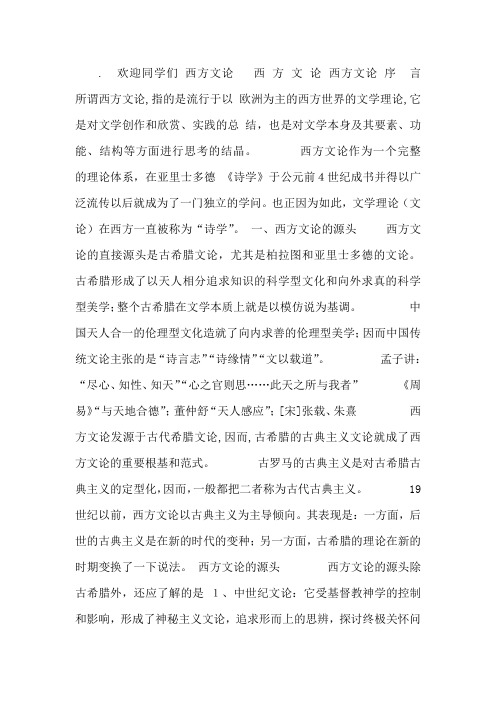
. 欢迎同学们西方文论西方文论西方文论序言所谓西方文论,指的是流行于以欧洲为主的西方世界的文学理论,它是对文学创作和欣赏、实践的总结,也是对文学本身及其要素、功能、结构等方面进行思考的结晶。
西方文论作为一个完整的理论体系,在亚里士多德《诗学》于公元前4世纪成书并得以广泛流传以后就成为了一门独立的学问。
也正因为如此,文学理论(文论)在西方一直被称为“诗学”。
一、西方文论的源头西方文论的直接源头是古希腊文论,尤其是柏拉图和亚里士多德的文论。
古希腊形成了以天人相分追求知识的科学型文化和向外求真的科学型美学;整个古希腊在文学本质上就是以模仿说为基调。
中国天人合一的伦理型文化造就了向内求善的伦理型美学;因而中国传统文论主张的是“诗言志”“诗缘情”“文以载道”。
孟子讲:“尽心、知性、知天”“心之官则思……此天之所与我者”《周易》“与天地合德”;董仲舒“天人感应”;[宋]张载、朱熹西方文论发源于古代希腊文论,因而,古希腊的古典主义文论就成了西方文论的重要根基和范式。
古罗马的古典主义是对古希腊古典主义的定型化,因而,一般都把二者称为古代古典主义。
19世纪以前,西方文论以古典主义为主导倾向。
其表现是:一方面,后世的古典主义是在新的时代的变种;另一方面,古希腊的理论在新的时期变换了一下说法。
西方文论的源头西方文论的源头除古希腊外,还应了解的是1、中世纪文论:它受基督教神学的控制和影响,形成了神秘主义文论,追求形而上的思辨,探讨终极关怀问题,把真善美结合起来。
2、康德,他在西方哲学、美学、文论上是承上启下的重要人物,西方现代文艺思潮的许多理论主张都打上了康德的印记。
二、西方文论的分界1、古典和现代的分界西方文论的发展,以19世纪为大的分界,19世纪以前为古典主义,19世纪中叶以后为现代主义2、现代和后现代的分界从20世纪60年代开始,整个欧洲、美国等西方世界的社会、文化、文学进入到了“后现代”时期。
(文学上的后现代主义)古典主义形成了浪漫主义和现实主义两大潮流。
西方文学理论 绪论

西方文学理论绪论一、西方文论的范围和基本内容主要指发源于古希腊的、以欧洲为主的西方文学理论遗产。
二、西方文论发展的基本历史脉络1、古典时期:古希腊罗马文论文论的主流是模仿说:柏拉图、亚里士多德2、神学时期:中世纪文论“经为寓意”说和“诗为寓意”说:阿奎那、但丁3、复苏时期:文艺复兴文论为诗辩护、悲剧理论、小说理论、艺术真实和想象:薄伽丘、卡斯特尔维屈罗、塞万提斯、莎士比亚4、展开时期:17—18世纪文论新古典主义文论以古希腊罗马文艺为经典和范本,强调服从权威、规范与统一,据此为文艺制定法则。
“三一律”。
启蒙主义文论的代表人物伏尔泰提倡古典主义传统;卢梭认为科学与艺术毁坏德行,主张“回到自然”;狄德罗提出文学的逼真性原则,严肃喜剧取代古典主义喜剧;鲍姆嘉通强调诗的感性构思方式、修辞对诗意的作用;莱辛批评古典主义的“诗画同一”说和“单纯肃穆”的审美趣味,,把人的动作和行动提到首位,倡导市民戏剧;赫尔德提出用民间诗歌的再生来复兴诗歌,发扬民族文学传统;维柯注重原始人的诗性思维。
5、德国古典时期康德提出了艺术是自由的游戏、美的艺术是天才的艺术等观点;歌德认为艺术模仿自然又高于自然,首创“世界文学”的概念;席勒认为艺术起源于游戏,论述了素朴的诗和感伤的诗(对现实主义和浪漫主义的探讨)、首次提出悲剧冲突论;黑格尔提出艺术分为象征的、古典的、浪漫的三种类型也是三个历史阶段的艺术史观念,在悲剧冲突说的基础上提出了“两善两恶的冲突”的悲剧本质说。
6、浪漫主义和现实主义时期浪漫主义追求理想的表现,强调想象和情感的巨大作用,鼓吹天才和个性解放,追求心灵自由和精神创造,崇尚自然,宣扬“回到自然”。
现实主义文论方面,巴尔扎克主张文学应像镜子一样,照生活原样表现世界,提出现实主义典型理论;司汤达提出文学就是社会的表现和文学的真实是虚构的真实的现实主义创作原则;别林斯基提出文学的真实性、典型性、完整性三原则车尔尼雪夫斯基提出“美是生活”的观点;杜勃罗留波夫将现实主义文论发展为真实性、典型性、形象性三原则;托尔斯泰主张文学要忠实地按照实际生活原样再现生活,文学的典型化原则。
西方文论选读自考重点

西方文论选读自考重点西方文论选读是一门重要的自考课程,涵盖了众多思想家和流派的理论观点。
以下将为您梳理这门课程的一些重点内容,帮助您更好地掌握相关知识。
一、古希腊罗马时期古希腊罗马时期是西方文论的源头。
柏拉图的“理念论”对后世影响深远。
他认为现实世界是对理念世界的模仿,艺术则是对现实世界的模仿,因此是“影子的影子”,与真理隔着三层。
但他也承认艺术能够激发人的情感。
亚里士多德则对柏拉图的观点进行了修正。
他强调艺术模仿的是“可能发生的事”,具有普遍性和必然性。
他的《诗学》是西方第一部系统的文艺理论著作,对悲剧进行了深入的探讨,提出了悲剧的“六要素”。
二、中世纪时期中世纪的文论受到基督教神学的影响。
圣奥古斯丁认为艺术应该为宗教服务,宣扬上帝的伟大。
托马斯·阿奎那则试图调和理性与信仰,认为艺术是上帝创造力的反映。
三、文艺复兴时期文艺复兴时期强调人文主义精神,主张以人为中心,反对神学束缚。
薄伽丘的《十日谈》通过故事展现了人性的多样和自由。
锡德尼在《为诗辩护》中强调诗歌的教育和娱乐功能,认为诗歌能够给人带来愉悦和启示。
四、新古典主义时期新古典主义强调理性、秩序和规则。
布瓦洛的《诗的艺术》提出了“三一律”原则,即时间、地点、情节的一致性。
这一时期的文论注重对古代文学的模仿和借鉴,追求形式的完美和典雅。
五、浪漫主义时期浪漫主义强调情感、想象和个性。
华兹华斯在《抒情歌谣集·序言》中主张诗歌应该是强烈情感的自然流露。
拜伦、雪莱等诗人的作品充满了反抗精神和对自由的追求。
六、现实主义时期现实主义关注社会现实,强调真实地反映生活。
巴尔扎克主张文学要成为社会的“书记员”,通过作品展现社会的全貌。
福楼拜注重对细节的精确描写,追求艺术的客观真实性。
七、现代主义时期现代主义文学呈现出多元化和创新的特点。
象征主义强调用象征、隐喻等手法表达内心的感受和体验。
意识流文学则打破传统的叙事结构,深入挖掘人物的内心意识流动。
西方文论教材

西方文论教材
以下是一些西方文论教材的推荐:
1. 《西方文论纲要》(An Introduction to Literature, Criticism, and Theory)- Terry Eagleton
这本书是一本经典的西方文论教材,涵盖广泛的文论理论,包括结构主义、后结构主义、女性主义、后殖民主义等等。
2. 《西方文论简史》(A Short History of Literary Criticism)- Terry Eagleton
这本书是对西方文论史发展的简明介绍,从古希腊到当代文论理论都有所涉及。
3. 《西方文学理论史》(Literary Theory: The Basics)- Hans Bertens
这本书是一本入门级的西方文论教材,解释了关键概念和主要理论流派,如结构主义、后现代主义、后殖民主义等。
4. 《西方文学理论导论》(Literary Theory: An Introduction)- Terry Eagleton
这本书是一本对西方文学理论及其应用的全面导论,涵盖了许多西方文论流派和重要的文学理论概念。
5. 《从批评到文化研究》(Beginning Theory)- Peter Barry
这本书是一本关于西方文论和文化研究的简明入门教材,涵盖了重要的文论概念和理论流派。
这些教材可以帮助读者了解并学习关于西方文论的重要理论和概念,适合那些对文学批评和文化研究感兴趣的学生和学者。
西方文论知识点总结
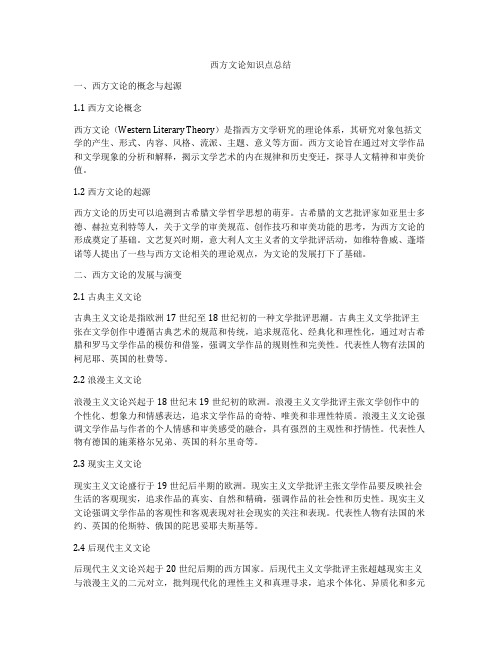
西方文论知识点总结一、西方文论的概念与起源1.1 西方文论概念西方文论(Western Literary Theory)是指西方文学研究的理论体系,其研究对象包括文学的产生、形式、内容、风格、流派、主题、意义等方面。
西方文论旨在通过对文学作品和文学现象的分析和解释,揭示文学艺术的内在规律和历史变迁,探寻人文精神和审美价值。
1.2 西方文论的起源西方文论的历史可以追溯到古希腊文学哲学思想的萌芽。
古希腊的文艺批评家如亚里士多德、赫拉克利特等人,关于文学的审美规范、创作技巧和审美功能的思考,为西方文论的形成奠定了基础。
文艺复兴时期,意大利人文主义者的文学批评活动,如维特鲁威、蓬塔诺等人提出了一些与西方文论相关的理论观点,为文论的发展打下了基础。
二、西方文论的发展与演变2.1 古典主义文论古典主义文论是指欧洲17世纪至18世纪初的一种文学批评思潮。
古典主义文学批评主张在文学创作中遵循古典艺术的规范和传统,追求规范化、经典化和理性化,通过对古希腊和罗马文学作品的模仿和借鉴,强调文学作品的规则性和完美性。
代表性人物有法国的柯尼耶、英国的杜费等。
2.2 浪漫主义文论浪漫主义文论兴起于18世纪末19世纪初的欧洲。
浪漫主义文学批评主张文学创作中的个性化、想象力和情感表达,追求文学作品的奇特、唯美和非理性特质。
浪漫主义文论强调文学作品与作者的个人情感和审美感受的融合,具有强烈的主观性和抒情性。
代表性人物有德国的施莱格尔兄弟、英国的科尔里奇等。
2.3 现实主义文论现实主义文论盛行于19世纪后半期的欧洲。
现实主义文学批评主张文学作品要反映社会生活的客观现实,追求作品的真实、自然和精确,强调作品的社会性和历史性。
现实主义文论强调文学作品的客观性和客观表现对社会现实的关注和表现。
代表性人物有法国的米约、英国的伦斯特、俄国的陀思妥耶夫斯基等。
2.4 后现代主义文论后现代主义文论兴起于20世纪后期的西方国家。
后现代主义文学批评主张超越现实主义与浪漫主义的二元对立,批判现代化的理性主义和真理寻求,追求个体化、异质化和多元化,强调文学作品的多样性和开放性。
西方文论

第三章 亚里士多德的诗学
• 亚里士多德(公元前384—前322), 古希腊马其顿斯吉塔拉人,世界古 代史上最伟大的哲学家、科学家和 教育家之一。马克思曾称他是古希 腊哲学家中最博学的人物,恩格斯 称他是古代的黑格尔。黑格尔称他 “人类导师”。 • 鲁开昂学园。 • 逍遥学派。
《诗学》
• 亚里士多德:《诗学》,罗念生译,见《诗 学· 诗艺》,人民文学出版社,1997年。 • 1、序论(1—5章),阐述诗的本质,模仿 的三点区别,诗的起源及史诗和悲剧的异同; • 2、悲剧论(6—22章) • 3、史诗论(22—25章) • 4、史诗与悲剧比较论(26章)
• 亚氏:卡塔西斯Katharsis——净化,“净 洗”、“宣泄”、“洗涤”。 • 亚里士多德:“像哀怜和恐惧或是狂热之类 情绪虽然只在一部分人心里是很强烈的,一 般人多少有一些。有些人受宗教狂热支配时, 一听到宗教的乐调,就卷入迷狂状态,随后 就安静下来,仿佛受到了一种治疗和净化。 这种情形当然也适用于受哀怜恐惧以及其他 类似情绪影响的人。…受到净化,因而心里 感到一种轻松舒畅的快感…”
四、摹仿与真理
• “洞喻” • “镜子喻” • “床喻” 第一种是床之所以为床的那个床的理念(Idea) 第二种是木匠依床的理念所制造出来的个别的床 第三种是画家摹仿个别的床所画的床—— “摹本的摹本”,“影子的影子”,“和真理隔 了两层” • 摹仿诗人是说谎者,他们的造物并不表现真理。
• “我认为,如果他(诗人)对自己摹仿的事物 有真知的话,他是一定宁可献身于真的东西 而不愿献身于摹仿的。他会热心于制造许多 出色的真的制品,留下来作自己身后的纪念。 他会宁愿成为一个受称羡的对象,而不会热 心于做一个称羡别人的人。”《理想国》
三、诗人的罪状
西方文论试题及答案
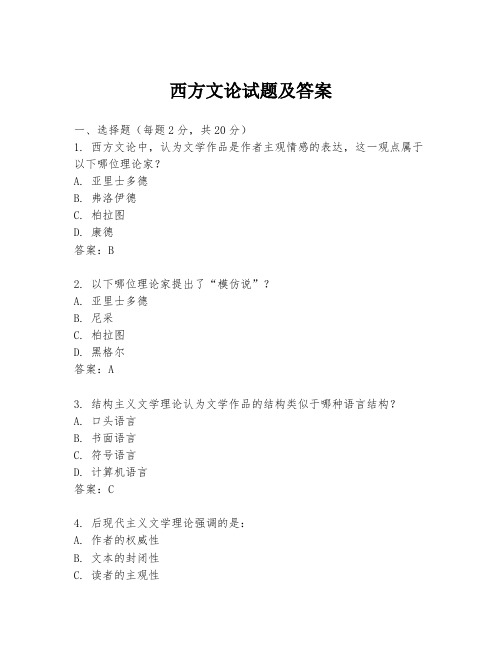
西方文论试题及答案一、选择题(每题2分,共20分)1. 西方文论中,认为文学作品是作者主观情感的表达,这一观点属于以下哪位理论家?A. 亚里士多德B. 弗洛伊德C. 柏拉图D. 康德答案:B2. 以下哪位理论家提出了“模仿说”?A. 亚里士多德B. 尼采C. 柏拉图D. 黑格尔答案:A3. 结构主义文学理论认为文学作品的结构类似于哪种语言结构?A. 口头语言B. 书面语言C. 符号语言D. 计算机语言答案:C4. 后现代主义文学理论强调的是:A. 作者的权威性B. 文本的封闭性C. 读者的主观性D. 文本的客观性答案:C5. 以下哪位理论家提出了“文学即游戏”的观点?A. 巴赫金B. 德里达C. 罗兰·巴特D. 艾略特答案:A6. 新历史主义文学批评强调的是:A. 文学作品的美学价值B. 文学作品的历史背景C. 文学作品的道德教化D. 文学作品的个人情感答案:B7. 以下哪位理论家是女性主义文学批评的代表人物?A. 弗吉尼亚·伍尔夫B. 西蒙·波伏娃C. 玛丽·沃斯通克拉夫特D. 贝蒂·弗里丹答案:B8. 马克思主义文学批评认为文学作品是:A. 作者个人情感的体现B. 社会经济基础的反映C. 作者个人经历的记录D. 文化传统的继承答案:B9. 接受美学认为文学作品的意义是由谁决定的?A. 作者B. 读者C. 批评家D. 出版商答案:B10. 以下哪位理论家提出了“解构主义”?A. 罗兰·巴特B. 雅克·德里达C. 米歇尔·福柯D. 保罗·德曼答案:B二、简答题(每题10分,共30分)1. 简述弗洛伊德的文学理论。
答案:弗洛伊德的文学理论认为文学作品是作者潜意识欲望的表达,通过文学作品可以揭示人类深层的心理动机和冲突。
2. 结构主义文学理论的主要观点是什么?答案:结构主义文学理论认为文学作品的意义是由其内在的结构决定的,文学作品之间存在共通的符号系统和规则,通过分析这些结构可以揭示文学作品的深层意义。
西方文论名词解释
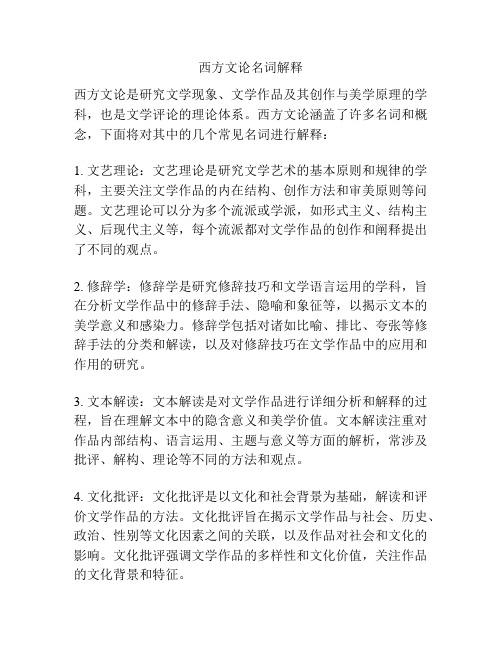
西方文论名词解释西方文论是研究文学现象、文学作品及其创作与美学原理的学科,也是文学评论的理论体系。
西方文论涵盖了许多名词和概念,下面将对其中的几个常见名词进行解释:1. 文艺理论:文艺理论是研究文学艺术的基本原则和规律的学科,主要关注文学作品的内在结构、创作方法和审美原则等问题。
文艺理论可以分为多个流派或学派,如形式主义、结构主义、后现代主义等,每个流派都对文学作品的创作和阐释提出了不同的观点。
2. 修辞学:修辞学是研究修辞技巧和文学语言运用的学科,旨在分析文学作品中的修辞手法、隐喻和象征等,以揭示文本的美学意义和感染力。
修辞学包括对诸如比喻、排比、夸张等修辞手法的分类和解读,以及对修辞技巧在文学作品中的应用和作用的研究。
3. 文本解读:文本解读是对文学作品进行详细分析和解释的过程,旨在理解文本中的隐含意义和美学价值。
文本解读注重对作品内部结构、语言运用、主题与意义等方面的解析,常涉及批评、解构、理论等不同的方法和观点。
4. 文化批评:文化批评是以文化和社会背景为基础,解读和评价文学作品的方法。
文化批评旨在揭示文学作品与社会、历史、政治、性别等文化因素之间的关联,以及作品对社会和文化的影响。
文化批评强调文学作品的多样性和文化价值,关注作品的文化背景和特征。
5. 结构主义:结构主义是20世纪中叶兴起的一种文学理论方法,强调文学作品的结构和形式,并认为结构和形式是作品中最重要的方面。
结构主义主张对作品进行系统的结构分析,关注作品中的二元对立、符号体系和内在结构模式等,强调了作品的自成系统性和普遍性。
6. 代表作:代表作是指某个作家、作品、时代或流派在一定领域或历史时期中代表性的作品。
代表作往往具有重要的历史、文化和艺术价值,具有典型性和影响力,代表着一定历史时期或文学传统的最高成果。
以上只是西方文论中的一些常见名词的简要解释,实际上西方文论涵盖的范围非常广泛,还有许多其他名词和概念需要深入研究和理解。
西方文论名词解释

西方文论名词解释西方文论是研究文学与文学作品的学科领域,旨在理解和解释文学作品的形式、风格、主题和意义。
在西方文论中,存在许多重要的名词,以下是其中几个的解释和拓展。
1. 《隐喻》(Metaphor):隐喻是一种修辞手法,通过将一个概念或事物与另一个不同的概念或事物进行比较,以便更好地理解或描述它们之间的关系。
隐喻在文学中经常被使用,能够产生强烈的意象和情感效果。
在文论中,隐喻也被用来分析文学作品中的象征、隐喻和隐含意义。
2. 《叙事》(Narrative):叙事是一种讲故事的方式,通过描述事件的发展和角色的行动来传达信息和意义。
在叙事理论中,研究者关注故事结构、叙述者角色、叙事技巧等方面,以揭示故事的效果和作者的意图。
3. 《文化批评》(Cultural Criticism):文化批评是一种从文化角度出发对文学作品进行分析和评价的方法。
它关注文学作品与社会、历史和文化背景之间的关系,以揭示作品所表达的价值观、意识形态和社会问题。
4. 《结构主义》(Structuralism):结构主义是一种文论方法,强调文本的内部结构和关系。
结构主义认为文本是由一系列相互关联的符号和结构组成的,通过研究这些符号和结构之间的关系,可以揭示文本的意义和结构。
5. 《后现代主义》(Postmodernism):后现代主义是一种对现代主义的反思和批判,强调多元性、相对性和不确定性。
后现代主义文论关注文学作品中的断裂、混杂和碎片化现象,以及文学作品对权力、真理和现实的挑战。
这些名词和概念在西方文论中扮演着重要的角色,帮助我们理解和解释文学作品的复杂性和多样性。
通过运用这些概念,我们可以深入探索文学作品的内涵和意义,并从中获得更深刻的阅读体验。
西方文论整合版
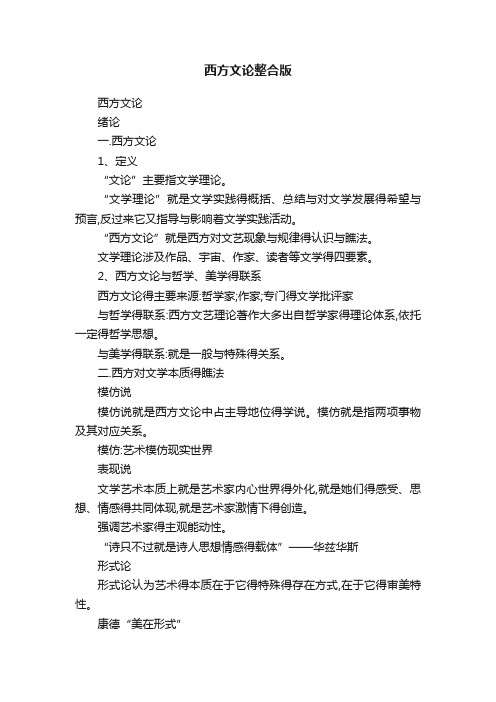
西方文论整合版西方文论绪论一.西方文论1、定义“文论”主要指文学理论。
“文学理论”就是文学实践得概括、总结与对文学发展得希望与预言,反过来它又指导与影响着文学实践活动。
“西方文论”就是西方对文艺现象与规律得认识与瞧法。
文学理论涉及作品、宇宙、作家、读者等文学得四要素。
2、西方文论与哲学、美学得联系西方文论得主要来源:哲学家;作家;专门得文学批评家与哲学得联系:西方文艺理论著作大多出自哲学家得理论体系,依托一定得哲学思想。
与美学得联系:就是一般与特殊得关系。
二.西方对文学本质得瞧法模仿说模仿说就是西方文论中占主导地位得学说。
模仿就是指两项事物及其对应关系。
模仿:艺术模仿现实世界表现说文学艺术本质上就是艺术家内心世界得外化,就是她们得感受、思想、情感得共同体现,就是艺术家激情下得创造。
强调艺术家得主观能动性。
“诗只不过就是诗人思想情感得载体”——华兹华斯形式论形式论认为艺术得本质在于它得特殊得存在方式,在于它得审美特性。
康德“美在形式”瓦尔德俄国形式主义:“陌生化”三.西方文艺理论得发展概况古代:(分古希腊与古罗马两部分)古希腊:柏拉图与亚里士多德《文艺对话录》《诗学》古罗马:贺拉斯《诗艺》古典主义及“寓教于乐”;朗吉纳斯《论崇高》中世纪:文艺理论也成为神学得附庸。
奥古斯丁《忏悔录》文艺复兴:但丁;达芬奇;锡德尼《为诗一辩》古典主义:又称新古典主义。
布瓦洛《诗得艺术》就是古典主义得法典。
启蒙主义:启蒙主义文论得主要目得就是宣扬资产阶级思想。
功利性。
代表:狄德罗、莱辛、歌德德国古典美学与文艺理论:18世纪末19世纪初。
康德《判断力批判》黑格尔《美学》。
浪漫主义文论:主要就是一些浪漫主义作家诗人得宣言。
华兹华斯《抒情歌谣集》序;雨果《克伦威尔》序;史达尔夫人《论文学》。
现实主义文论:主要以批判现实主义作家为主。
巴尔扎克《人间喜剧》序;左拉;托尔斯泰《艺术论》;别林斯基;泰纳(种族、环境、时代) 现代主义文艺理论:形式主义;结构主义;阐释学;后结构主义;心理分析批评;新历史主义。
西方文论doc
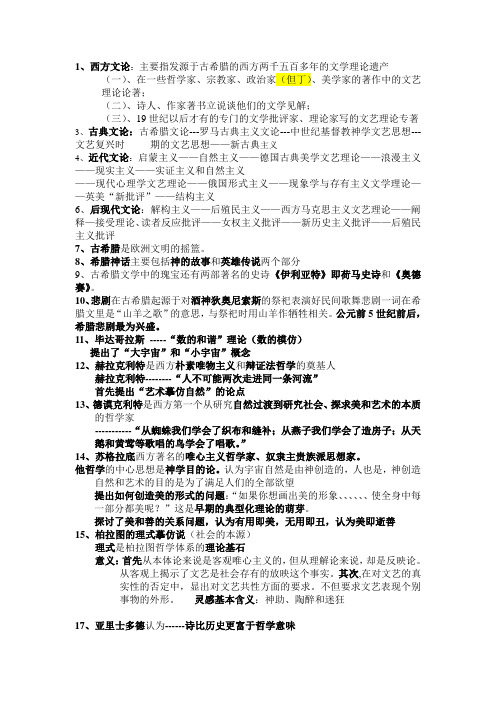
1、西方文论:主要指发源于古希腊的西方两千五百多年的文学理论遗产(一)、在一些哲学家、宗教家、政治家(但丁)、美学家的著作中的文艺理论论著;(二)、诗人、作家著书立说谈他们的文学见解;(三)、19世纪以后才有的专门的文学批评家、理论家写的文艺理论专著3、古典文论:古希腊文论---罗马古典主义文论---中世纪基督教神学文艺思想---文艺复兴时期的文艺思想——新古典主义4、近代文论:启蒙主义——自然主义——德国古典美学文艺理论——浪漫主义——现实主义——实证主义和自然主义——现代心理学文艺理论——俄国形式主义——现象学与存有主义文学理论——英美“新批评”——结构主义6、后现代文论:解构主义——后殖民主义——西方马克思主义文艺理论——阐释—接受理论、读者反应批评——女权主义批评——新历史主义批评——后殖民主义批评7、古希腊是欧洲文明的摇篮。
8、希腊神话主要包括神的故事和英雄传说两个部分9、古希腊文学中的瑰宝还有两部著名的史诗《伊利亚特》即荷马史诗和《奥德赛》。
10、悲剧在古希腊起源于对酒神狄奥尼索斯的祭祀表演好民间歌舞悲剧一词在希腊文里是“山羊之歌”的意思,与祭祀时用山羊作牺牲相关。
公元前5世纪前后,希腊悲剧最为兴盛。
11、毕达哥拉斯-----“数的和谐”理论(数的模仿)提出了“大宇宙”和“小宇宙”概念12、赫拉克利特是西方朴素唯物主义和辩证法哲学的奠基人赫拉克利特--------“人不可能两次走进同一条河流”首先提出“艺术摹仿自然”的论点13、德谟克利特是西方第一个从研究自然过渡到研究社会、探求美和艺术的本质的哲学家-----------“从蜘蛛我们学会了织布和缝补;从燕子我们学会了造房子;从天鹅和黄莺等歌唱的鸟学会了唱歌。
”14、苏格拉底西方著名的唯心主义哲学家、奴隶主贵族派思想家。
他哲学的中心思想是神学目的论。
认为宇宙自然是由神创造的,人也是,神创造自然和艺术的目的是为了满足人们的全部欲望提出如何创造美的形式的问题:“如果你想画出美的形象、、、、、、使全身中每一部分都美呢?”这是早期的典型化理论的萌芽。
西方文论名词解释
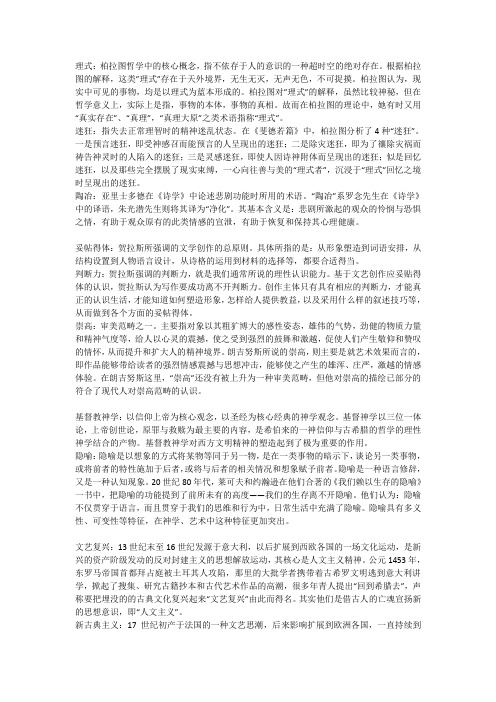
理式:柏拉图哲学中的核心概念,指不依存于人的意识的一种超时空的绝对存在。
根据柏拉图的解释,这类”理式”存在于天外境界,无生无灭,无声无色,不可捉摸。
柏拉图认为,现实中可见的事物,均是以理式为蓝本形成的。
柏拉图对”理式”的解释,虽然比较神秘,但在哲学意义上,实际上是指,事物的本体,事物的真相。
故而在柏拉图的理论中,她有时又用“真实存在”、“真理”,“真理大原”之类术语指称“理式”。
迷狂:指失去正常理智时的精神迷乱状态。
在《斐德若篇》中,柏拉图分析了4种“迷狂”。
一是预言迷狂,即受神感召而能预言的人呈现出的迷狂;二是除灾迷狂,即为了禳除灾祸而祷告神灵时的人陷入的迷狂;三是灵感迷狂,即使人因诗神附体而呈现出的迷狂;似是回忆迷狂,以及那些完全摆脱了现实束缚,一心向往善与美的“理式者”,沉浸于“理式”回忆之境时呈现出的迷狂。
陶冶:亚里士多德在《诗学》中论述悲剧功能时所用的术语。
“陶冶”系罗念先生在《诗学》中的译语,朱光潜先生则将其译为“净化”。
其基本含义是:悲剧所激起的观众的怜悯与恐惧之情,有助于观众原有的此类情感的宣泄,有助于恢复和保持其心理健康。
妥帖得体:贺拉斯所强调的文学创作的总原则。
具体所指的是:从形象塑造到词语安排,从结构设置到人物语言设计,从诗格的运用到材料的选择等,都要合适得当。
判断力:贺拉斯强调的判断力,就是我们通常所说的理性认识能力。
基于文艺创作应妥贴得体的认识,贺拉斯认为写作要成功离不开判断力。
创作主体只有具有相应的判断力,才能真正的认识生活,才能知道如何塑造形象,怎样给人提供教益,以及采用什么样的叙述技巧等,从而做到各个方面的妥帖得体。
崇高:审美范畴之一。
主要指对象以其粗犷博大的感性姿态,雄伟的气势,劲健的物质力量和精神气度等,给人以心灵的震撼,使之受到强烈的鼓舞和激越,促使人们产生敬仰和赞叹的情怀,从而提升和扩大人的精神境界。
朗吉努斯所说的崇高,则主要是就艺术效果而言的,即作品能够带给读者的强烈情感震撼与思想冲击,能够使之产生的雄浑、庄严,激越的情感体验。
二十世纪西方文论流派
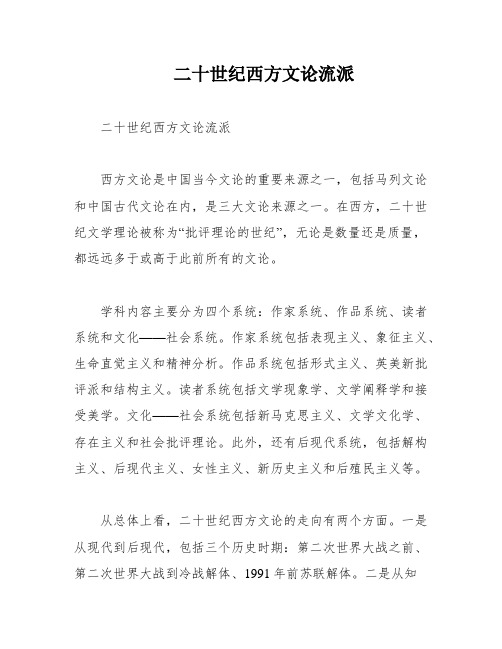
二十世纪西方文论流派二十世纪西方文论流派西方文论是中国当今文论的重要来源之一,包括马列文论和中国古代文论在内,是三大文论来源之一。
在西方,二十世纪文学理论被称为“批评理论的世纪”,无论是数量还是质量,都远远多于或高于此前所有的文论。
学科内容主要分为四个系统:作家系统、作品系统、读者系统和文化——社会系统。
作家系统包括表现主义、象征主义、生命直觉主义和精神分析。
作品系统包括形式主义、英美新批评派和结构主义。
读者系统包括文学现象学、文学阐释学和接受美学。
文化——社会系统包括新马克思主义、文学文化学、存在主义和社会批评理论。
此外,还有后现代系统,包括解构主义、后现代主义、女性主义、新历史主义和后殖民主义等。
从总体上看,二十世纪西方文论的走向有两个方面。
一是从现代到后现代,包括三个历史时期:第二次世界大战之前、第二次世界大战到冷战解体、1991年前苏联解体。
二是从知识话语到意识形态文本,即从知识文化到意识形态文本。
此外,还有从诗学文化到文化诗学的转变,文学理论批评自成体系。
总之,二十世纪西方文论的发展对于中国当今文论的研究和借鉴具有重要意义。
诗学文化是从艺术性出发,研究文学在语言、结构和形式中所蕴含的文化意义。
在象征主义、形式主义、新批评派、符号学和结构主义等文论中,隐藏着文化的内涵。
文化诗学则是以非文学系统和视角分析、研究文学现象,展示文化与文学和艺术之间的深刻联系,探索文学的独特性和文化性,表达文学对文化建设的意义、价值和功能。
精神分析、现象学、阐释学、文化学、人类学、社会学、新马克思主义、存在主义以及女性主义等多重视角介入文学研究和批评。
20世纪下半叶文化诗学的五个关键词是马克思主义、意识形态、文化、解构和后现代。
以意识形态为轴心,从世界和历史、文化、男权和女性、建构和解构等多重维度,较为全面地展示了文化诗学的复杂性和多重性。
20世纪文论呈现出从分析走向综合的趋向。
从现代到后现代,从知识话语到意识形态文本,从诗学文化到文化诗学,整体上呈现出从分析走向综合的趋向。
西方文论史名词解释
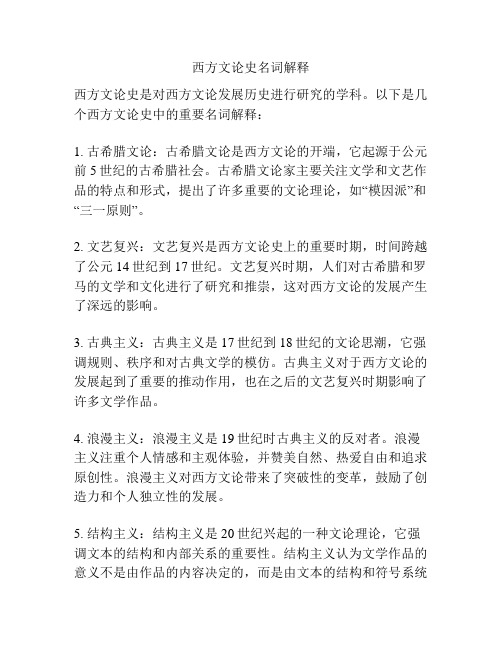
西方文论史名词解释西方文论史是对西方文论发展历史进行研究的学科。
以下是几个西方文论史中的重要名词解释:1. 古希腊文论:古希腊文论是西方文论的开端,它起源于公元前5世纪的古希腊社会。
古希腊文论家主要关注文学和文艺作品的特点和形式,提出了许多重要的文论理论,如“模因派”和“三一原则”。
2. 文艺复兴:文艺复兴是西方文论史上的重要时期,时间跨越了公元14世纪到17世纪。
文艺复兴时期,人们对古希腊和罗马的文学和文化进行了研究和推崇,这对西方文论的发展产生了深远的影响。
3. 古典主义:古典主义是17世纪到18世纪的文论思潮,它强调规则、秩序和对古典文学的模仿。
古典主义对于西方文论的发展起到了重要的推动作用,也在之后的文艺复兴时期影响了许多文学作品。
4. 浪漫主义:浪漫主义是19世纪时古典主义的反对者。
浪漫主义注重个人情感和主观体验,并赞美自然、热爱自由和追求原创性。
浪漫主义对西方文论带来了突破性的变革,鼓励了创造力和个人独立性的发展。
5. 结构主义:结构主义是20世纪兴起的一种文论理论,它强调文本的结构和内部关系的重要性。
结构主义认为文学作品的意义不是由作品的内容决定的,而是由文本的结构和符号系统决定的。
6. 后现代主义:后现代主义是20世纪后期的文论思潮,它对现代主义的理论和实践进行了批判和反思。
后现代主义强调“没有中心”和“没有固定的真理”,鼓励多元化和去中心化的文学创作。
7. 女性主义批评:女性主义批评是对文学作品中性别不平等和压迫的批判和探讨。
女性主义批评关注女性形象的塑造和女性作者的地位,倡导女性权益和平等的发展。
西方文论史的各个时期和理论都对西方文学和文化产生了重要的影响,也对后世的文论研究起到了指导作用。
了解这些重要的名词和概念,可以帮助我们更好地理解和研究西方文论的发展和变迁。
西方文论

由此可见,柏拉图也并不是要彻底否定文艺, 他只是觉得现有的作品不符合他的要求。柏拉图非 常赞赏合乎其要求的文艺作品:
‚至于另外一类文章却是可以给人教益的, 而且以给人教益为目标的,其实就是把真善 美的东西写到读者心灵里去,只有这类文章 才可以达 到 清晰 完 美 , 也 才值得写 , 值 得 读‛。(斐德诺篇)(p174)
第一讲 柏拉图的文论与美学
一、生平与著述
柏拉图(前427?——前 347)出身于雅典贵族,原 名为亚里斯多克勒斯 (Aristokles),后来因为他 强壮的身躯而被称为柏拉图 (在希腊语中,Platus一词是 “平坦、宽阔”等意思)。
有说柏拉图这个名字是来 自他流畅宽广(platutês)的 口才、 或因为他拥有宽广的 前额。
后来柏拉图又提出美是有用,美是善,美是 起于听觉和视觉的快感,美是有益的快感等 等与希庇阿斯讨论,又都一一作了否决。最 后,柏拉图慨叹:‚美是难的 ‛。
(二)、柏拉图美论的意义
1、在美学史上第一次明确区分了美的现 象与美的本质,并把研讨的目光锁定在对美 的本质(即美本身)的探究上,这一思路影 响后世美学两千多年。
也正因为其重视文艺的社会作用、教育 作用,柏拉图也希望能产生一种能符合他理 想的,以善为先的诗歌。他提出了一个允许 诗人回来的条件,就是要能证明诗人:‚不 仅能引起快感,而且对于国家和人生都有效 用‛(卷十)。‚他们的作品须对于我们有益, 须只摹仿好人的言行 ‛(卷二、三)。 他的学 生亚里士多德后来在《诗学》中对此进行了 论说。
西方文论梳理

西方文论梳理第一章古希腊罗马时期文学理论(一)修辞批评1、希腊遗产特征:理性精神。
内容:首先体现在对理性自足作用的突出;其次体现在希腊宗教的独特特征上;再次体现在希腊的社会风俗上。
2、“理性”与“崇高”是这一时期古典文论的形态表现。
3、智者(学派)“语言本体论”:首先是语法,语言的技艺(亚里士多德五原则p10);其次是正名,措辞的技艺。
4、逻各斯:在古希腊的理智生活中重要而涵义复杂,如尺度、对应关系、公式、言词等。
智者则在两个层面上使用这一概念:一是指使用语言的艺术,二是指论辩的艺术。
具体而言,逻各斯包含三层意思:语言的在语法意义上的规范使用;思维方法和思维形式;语言所表述的思想内容。
5、智者学派的“文学理论观”:语言的文学运用具有韵律性,给人美感;文学内容的基本特征是虚构性,使观众在心灵上受到“蒙蔽”。
6、缺陷:诡辩;语言实用主义;不顾整体,专注细节;虚无主义;相对主义。
(二)苏格拉底—柏拉图的文学理论1、苏柏的思想就是要和以“迷狂”的方式反映人的永恒价值的“诗”联合起来,反对智者对语言工具性的使用。
苏柏文学认识的最初视域:诗(文学)的本质;诗(文学)的社会地位;诗(文学)的作用。
2、诗与真:模仿论1)理念论是其文艺思想的核心。
柏拉图理念论:“共相世界”是本原的世界,表象世界相对于“共相世界”而言是一种次级的存在的世界。
P13柏拉图划分了两个世界:经验世界(无限)和理念世界(有限)。
理念是原型,是正本,经验世界是摹本,它是以理念的范型铸造出来的。
艺术世界又是经验世界的摹本。
2)柏拉图将诗歌定义为一种“模仿”,他还区分了“模仿”和“叙述”:“模仿”是直接模仿一个人的言行,“叙述”则是诗人自己在讲话。
文学是对表象世界的模仿,总是感性的,关注的只是具体的东西,所以文学与真理无缘。
3、灵感说和迷狂说1)“灵感”含有“神启”“天赋”“迷狂”等含义,原词词义就是“神灵附体”的癫狂状态。
“灵感”的表现是“迷狂”。
西方文论

西方文论柏拉图文论观点1、文艺本质论:影子摹仿论即他把世界划分为理式世界、现实世界和艺术世界三种。
理式世界是由一系列理式构成,它们永恒不变,绝对同一,是唯一真实的本体。
现实世界的万事万物都不过是理式世界的摹本,是“分有”理式世界的结果。
艺术世界,则只是对个别的具体的事物的外形的摹仿,所得到的只是一种“影像”或“幻相”,所以更不真实。
它“和真实体隔着三层”,只能算是“摹本的摹本”、“影子的影子”。
2、创作灵感论:迷狂说即柏拉图认为,诗人获得灵感时的心理状态是一种迷狂的。
即“诗兴得迷狂”是由诗神凭附而来的。
它凭附到一个温柔贞洁的心灵,感发它,引它到兴高采烈神飞色舞的境界,流露于各种诗歌。
3、艺术理想论:真善美统一论柏拉图提出,写文章和口说文章都有好坏之分,即要求好的文章是“以给人教益为目标的,就是把真善美的东西写到读者心灵里去。
”只有这类文章才可以达到清晰完美,也才值得写,值得读。
4、文艺功能论:文艺为政治服务柏拉图提出“文艺不仅能引起快感,而且对于国家和人生都有效用”即要求文艺为政治服务,通过文艺培养和教育出忠诚勇敢的城邦保卫者。
泰纳的实证主义文论一种族、环境、时代“三要素”1关于种族他主张种族特性是一种天生的遗传性,这是从生理特征而不是从社会文化特征角度来界定种族特性的。
他认为种族与民族的区别在于:种族性格是不变的,而民族性格则是变动的。
这种观点切断了种族与民族的联系,使种族成为抽象的、没有具体文化内容的生物特征,具有明显的反历史性。
2关于环境泰纳所指的“环境”有时是指地理环境、气候条件,有时是指政治的和社会的条件。
3关于时代泰纳称时代为“精神的气候”。
精神气候对艺术产生作用在于一是时代精神状态对艺术家起着作用。
二是艺术家创作一件艺术品,除了艺术家本人的苦工外,还包括周围的群众以及前几代群众的苦工与天才。
三艺术家从事创作,必然希望受到大众的赏识和赞美。
关于种族、环境、时代三要素的关系,泰纳认为,种族、环境、时代是构成精神文化的三个要素,也是艺术创造的三个原始力量。
西方文论课程的收获与感悟

西方文论课程的收获与感悟
西方文论课程是一门深入研究西方文学理论、文学批评和文学思潮的学科。
通过这门课程,我获得了许多宝贵的收获和感悟。
首先,我深入了解了西方文学的发展历程和重要文论思想。
从古希腊的亚里士多德到现代的德里达,从浪漫主义、现实主义、现代主义到后现代主义,通过对不同时期、不同流派的文学理论和批评的学习,我对西方文学的演变和发展有了更加清晰的认识。
其次,我学会了如何运用文论知识分析文学作品。
文论课程不仅教授理论知识,还注重实践应用。
通过分析具体的文学作品,我学会了如何从不同的角度和层面解读文本,发掘其中的深层含义和艺术价值。
这种分析能力的培养对于提高我的阅读和理解能力具有重要意义。
第三,我对文化、社会和历史背景在文学中的体现有了更深刻的理解。
西方文论课程不仅关注文学本身,还涉及到文化、社会和历史等多个领域。
在学习过程中,我逐渐意识到文学作品是特定历史和社会背景下的产物,与文化、政治、经济等因素密切相关。
这种跨学科的学习方法让我更加全面地理解文学的本质和价值。
最后,我对自己的思考方式和价值观产生了积极的影响。
在学习西方文论的过程中,我不仅接触到了不同的思想和观点,还学会了批判性思维和独立思考。
通过与同学、老师的交流和讨论,我逐渐形成了自己的见解和判断力,对人生和社会有了更深入的思考。
总之,西方文论课程是一门非常有价值的学科,它不仅提高了我的学术素养,还对我的思维方式和价值观产生了深远的影响。
我相信这些
收获和感悟将在未来的学习和生活中发挥重要作用。
西方文论教学大纲
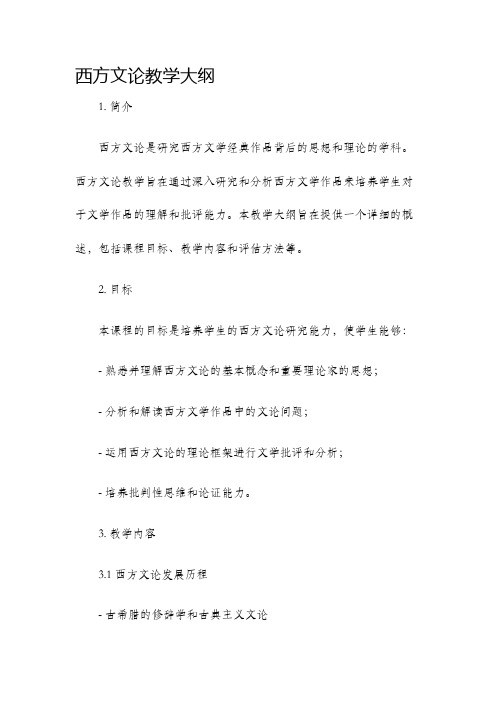
西方文论教学大纲1. 简介西方文论是研究西方文学经典作品背后的思想和理论的学科。
西方文论教学旨在通过深入研究和分析西方文学作品来培养学生对于文学作品的理解和批评能力。
本教学大纲旨在提供一个详细的概述,包括课程目标、教学内容和评估方法等。
2. 目标本课程的目标是培养学生的西方文论研究能力,使学生能够:- 熟悉并理解西方文论的基本概念和重要理论家的思想;- 分析和解读西方文学作品中的文论问题;- 运用西方文论的理论框架进行文学批评和分析;- 培养批判性思维和论证能力。
3. 教学内容3.1 西方文论发展历程- 古希腊的修辞学和古典主义文论- 文艺复兴时期的人文主义文论- 哥特学派和浪漫主义文论- 结构主义和后现代主义文论3.2 主要的西方文论理论家- 亚里士多德:戏剧理论- 锡摩涅德斯:史诗理论- 弗洛伊德:精神分析理论- 托尔斯泰:小说理论- 巴克金:叙事理论- 巴赫金:读者响应理论- 德勒兹:后现代主义理论3.3 概念和相关理论- 文学批评方法论- 叙事结构和叙述技巧- 观众/读者的角色和影响- 文学与社会/政治/历史的关系- 性别/阶级/种族等身份政治的分析4. 教学方法为了达到教学目标,本课程将采用以下教学方法:- 讲座:介绍和讲解西方文论的基本概念和理论,以及相关文学作品的分析。
- 小组讨论:组织学生进行文学作品的分析和讨论,促进互动和批判性思维。
- 阅读和写作:要求学生独立阅读并理解文学作品,撰写相关的学术论文或评论。
- 演示和练习:通过展示范例和进行实践练习,帮助学生理解和应用西方文论的方法和理论。
5. 评估方法为了评估学生的学习成果,本课程将采用以下评估方法:- 期中考试:检验学生对于西方文论的基本概念和理论的掌握程度。
- 书面作业:要求学生根据所学的理论分析文学作品。
- 学术论文:要求学生撰写一篇具有一定研究价值的学术论文,展示对于西方文论的深入理解和批判性思考能力。
- 参与度和小组讨论:评估学生在小组讨论中的参与度和批判性思维能力。
有关西方文论中文书籍
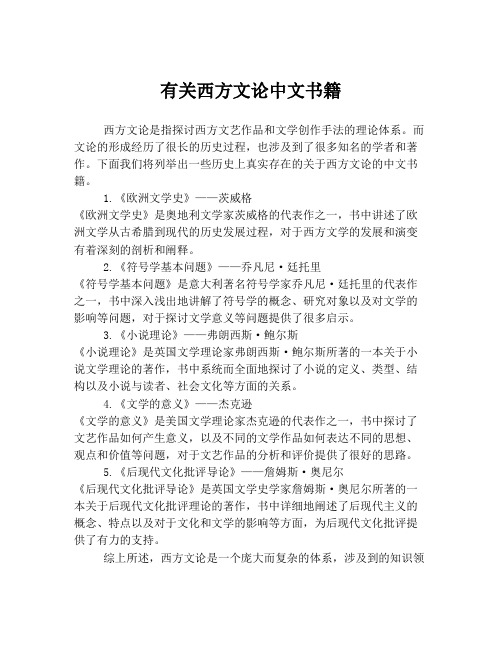
有关西方文论中文书籍西方文论是指探讨西方文艺作品和文学创作手法的理论体系。
而文论的形成经历了很长的历史过程,也涉及到了很多知名的学者和著作。
下面我们将列举出一些历史上真实存在的关于西方文论的中文书籍。
1.《欧洲文学史》——茨威格《欧洲文学史》是奥地利文学家茨威格的代表作之一,书中讲述了欧洲文学从古希腊到现代的历史发展过程,对于西方文学的发展和演变有着深刻的剖析和阐释。
2.《符号学基本问题》——乔凡尼·廷托里《符号学基本问题》是意大利著名符号学家乔凡尼·廷托里的代表作之一,书中深入浅出地讲解了符号学的概念、研究对象以及对文学的影响等问题,对于探讨文学意义等问题提供了很多启示。
3.《小说理论》——弗朗西斯·鲍尔斯《小说理论》是英国文学理论家弗朗西斯·鲍尔斯所著的一本关于小说文学理论的著作,书中系统而全面地探讨了小说的定义、类型、结构以及小说与读者、社会文化等方面的关系。
4.《文学的意义》——杰克逊《文学的意义》是美国文学理论家杰克逊的代表作之一,书中探讨了文艺作品如何产生意义,以及不同的文学作品如何表达不同的思想、观点和价值等问题,对于文艺作品的分析和评价提供了很好的思路。
5.《后现代文化批评导论》——詹姆斯·奥尼尔《后现代文化批评导论》是英国文学史学家詹姆斯·奥尼尔所著的一本关于后现代文化批评理论的著作,书中详细地阐述了后现代主义的概念、特点以及对于文化和文学的影响等方面,为后现代文化批评提供了有力的支持。
综上所述,西方文论是一个庞大而复杂的体系,涉及到的知识领域也很广泛。
而以上列举出的一些中文书籍则是对于探讨西方文论有着较好指导作用和参考意义的重要著作。
- 1、下载文档前请自行甄别文档内容的完整性,平台不提供额外的编辑、内容补充、找答案等附加服务。
- 2、"仅部分预览"的文档,不可在线预览部分如存在完整性等问题,可反馈申请退款(可完整预览的文档不适用该条件!)。
- 3、如文档侵犯您的权益,请联系客服反馈,我们会尽快为您处理(人工客服工作时间:9:00-18:30)。
b.
(2) Nowadays: a. It is maintained in requirements for examinations by the state system of examinations. b. It has almost disappeared in Germany. c. Only can find on the bookshelves of the educated bourgeoisies (who for the most part opens them, lacking a more appropriate literary dictionary to answer literary quiz questions) d. In university course catalogs literary history is clearly disappearing.
(2) Jauss’s famous views: 1.He differs from Iser: a. His theory is more hermeneutic in nature b. He emphasizes more on the interpretation of textual meaning
Literature History as a Challenge to Literary Theory (Hans Rober Jauss, 1921---)
1.The brief introduction of Hans Robert Jauss 2.The decline of literature history 3.Two ways of arranging the literature history 4.What is literature history? 5.A renewal of literary history.
2.The decline of literature history
(1)Before: a. To write the history of a national literature counted in the time of Gervinus and Scherer. The patriarchs regard representing in the history of literary works the idea of national individuality as their highest goal.
2.Meaning of text --- locate in the relation of past to present Textual interpretation --- a question of reconstructing the reader’s “horizon of expectation”(期待视野) (文本的意义要通过过去与现在的关系来把握,文本的解 读在很大程度上是一个重构读者“期待视野”的过程)
(2)R.G.Collingwood’s definition of history.
R.G. Collingwood --- history is nothing but the re-enactment of past thought in the historian’s mind. A literary work is much more like an orchestration that strikes ever new resonances among its readers and that frees the text from the material of the words and brings it to a contemporary existence. 一部文学作品更像是一曲管弦乐,永远在读者心中激起新的回响, 它把文本从严词材料中解脱出来,赋予他以现实的存在。 This dialogical character of the literary work also establishes why philological understanding can exist only in a perpetual confrontation with the text, and cannot be allowed to be reduced to a knowledge of facts. 文学作品的这种对话性决定了语言研究必须不断面向文本,而不 能简化成对事实的了解。
e. The philologists of my generation have replaced the traditional presentation of their national literature by periods and as a whole with lectures on the history of a problem or with other systematic approaches. f. Collective projects in the form of handbooks, encyclopedias, and series of collected interpretations have driven out literary histories as unserious and presumptuous. g. Serious scholarship prefer the stricter standard of the literary critical methods (stylistic, rhetoric, textual philology, semantics, poetics, morphology, historical philology, and the history of motifs and genres)
(3)Friedrich Schiller’s definition of history • Can promise so little instruction to the “thoughtful observer”, no imitative model at all to the “active man of the world”, no important information to the “philosopher”, and everything else but a “source of the noblest pleasure” to the reader. • 对爱思考的读者没能提供什么指导,对头脑活跃者根本没 有提供可供模仿的模式,对哲学家则提供不出什么重要的 信息,向读者提供不出最高贵的快乐之源泉。
1.The brief introduction of Hans Robert Jauss
(1) Hans Robert Jauss (1921---) a. Studied at the U of Heidelberg b. Taught since 1966 at the newly established U of Constance c. One of the two representatives of the Constance School of Rezeptionasathetik (美学康斯坦茨学派) d. Known for a hermeneutically(阐释学) based approach to literature and liarranging the literature history
(1) The first way: a mere anal-like lining up of the facts by arranging its material according to general tendencies, genres, and whathave-you Disadvantages: The author’s biography and the evaluation of their pop up in some accidental spot, in the manner of an occasional aside. It is more often in the modern literature.
4.What is literature history?
(1)Dilemma: • Gervinus: Simply sets the life and work of the writers one after another in a chronological series is no history, it is scarcely the skeleton of a history. • It is not only rare but forbidden that a literary historian should hold judgments of quality concerning the works of past ages.
(2) How to deal with the dilemma? Appeal to the idea of objectivity of historiography, which only has to describe “how is really was.” Reason: a. His aesthetic abstinences has good grounds. For the quality and rank of a literary work result from the criteria of influence, reception, and posthumous fame, criteria that are more difficult to grasp. b. If the author left the judgments of his own, he remains in his historical distance most often one to two generations behinds the latest development in literature.
